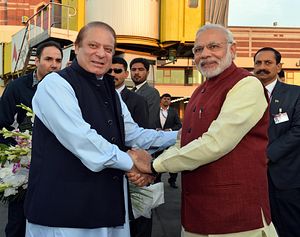Last week, I discussed Indian Prime Minister Narendra Modi’s bold surprise stopover in Lahore on his way back from Kabul. The Lahore stunt was a great photo op and ended 2015 on a high note, but the potential for India-Pakistan ties to derail in the new year was always present. I suggested that “unforeseen events, including a major terrorist attack on Indian soil by Pakistan-based terrorists” could derail talks. Unfortunately, just eight days after Modi had departed Lahore, six unidentified militants struck the Indian Air Force Station at Pathankot, in northern Punjab.
Over nearly three days of fighting, seven Indian security personnel were killed by the militants. On January 4, the sixth and final attacker was reported dead. Though the identities of the attackers remain undetermined, reports citing senior Indian officials have suggested that they belonged to Jaish-e-Mohammed, a Kashmiri separatist group designated as a terrorist group by several states and the United Nations. Separately, on Saturday, militants in the Afghan city of Mazar-i-Sharif assaulted an area surrounding the Indian consulate. That these attacks came days after the Lahore theatrics is no coincidence.
If photographs of Modi and Sharif walking hand-in-hand while grinning had caused undue optimism about the prospects for peace between India and Pakistan in the new year, the attack at Pathankot should restore a degree of sobriety to expectations. The Hindu reports that senior Indian intelligence officials are alleging that the militants at Pathankot had received training from a “professional armed force in Pakistan.” If these attackers were indeed Jaish-e-Mohammed militants, abetted and trained by Pakistan’s Inter-Services Intelligence, then, like last July’s attack at Gurdaspur and, more importantly, the November 2008 terror attacks in Mumbai, we can expect a slowdown in the pace of rapprochement between New Delhi and Islamabad.
The fundamental problem for the Indian prime minister in approaching Pakistan is the great ‘known unknown’ variable of the degree to which the Pakistan’s army is on board with comprehensive peace talks. As Praveen Swami argues at the Indian Express, the Pathankot attack suggests that the answer is likely no. Reports around Modi’s Lahore stopover that Lt. Gen. Nasir Khan Janjua appointment as Pakistan’s new national security adviser had ‘linked’ the country’s civilian leadership’s preferences with the military appear less grounded now.
So far, the Indian government’s response has been cautious and unwilling to give up on the recent Modi-Sharif camaraderie in Lahore. Modi condemned the Pathankot attackers as “enemies of humanity”–a statement that was read by some Indian observers as insufficiently blunt in calling out Pakistan. Irfan Siddiqui, a special adviser to Nawaz Sharif, cautioned India against pointing fingers at Pakistan. “India should understand that Pakistan itself had been one of the greatest victims of terrorist attacks on its soil,” he said.
Still, Rajnath Singh, India’s Minister of Home Affairs, encapsulated the Modi government’s long-stated approach to peace talks with Pakistan: “We want good relations with not just Pakistan but with all our neighbours. We also want peace but if there is any terror attack on India, we will give a befitting reply.” Despite Singh’s assurances, New Delhi isn’t positioned to impose kinetic costs on Pakistan for its continued use of sub-conventional warfare to extract diplomatic leverage. While it can choose to impose economic costs on Pakistan, doing so will do little to condition those elements in the Pakistani military that would see peace talks forestalled until India is ready to make key concessions on Kashmir.
For India, the challenge now will be navigating a return to comprehensive peace talks against the backdrop of the attack at Pathankot. New Delhi has sought to pursue a ‘twin track’ approach to diplomacy with Pakistan, where it attempts to push ahead toward peace while seeking to simultaneously punish Pakistan for behavior it deems inappropriate. Pathankot’s lasting impact on the current spell of rapprochement is yet to be determined. It could go down as a minor road bump, or it may be the beginning of another complete derailment.
For both sides, the focus should be on productive diplomacy at the level of foreign secretaries and a continued security dialogue at the national security advisor level. If anything, for Modi’s government, Pathankot is a reminder that the path toward peace will be far from frictionless this year.
































